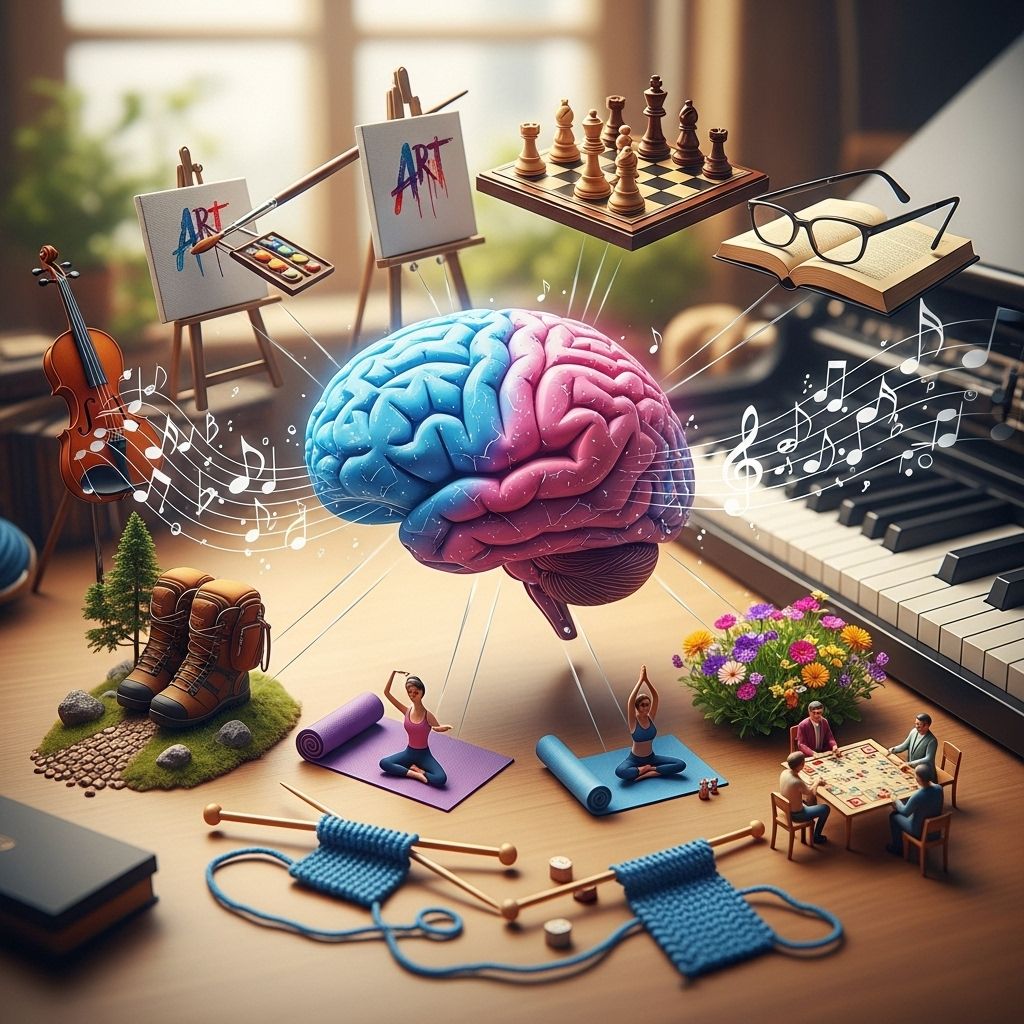10 Scientifically Proven Hobbies That Boost Brain Health
Engaging pastimes like dancing or gardening unlock sharper thinking and vitality.

10 Best Hobbies for Brain Health, According to Neuroscientists
Maintaining your brain’s peak condition requires more than routine mental exercises; it may be time to revive a beloved pastime or try something new. Neuroscientists emphasize that engaging in hobbies is one of the most effective strategies for keeping your brain healthy and resilient throughout life. In this comprehensive guide, we’ll explore ten hobbies—each backed by scientific research—and show how they promote brain health, happiness, and overall wellbeing.
These activities stimulate different brain areas, encourage growth of new neural connections, and can be adapted for any age. Whether your goal is to boost memory, enhance mood, or promote lifelong learning, there’s a hobby here to suit your lifestyle.
Why Hobbies Matter for Brain Health
- Neuroplasticity: Hobbies challenge the brain, encouraging it to reorganize and create new neural pathways, a principle called neuroplasticity. This capacity continues throughout the human lifespan, allowing adaptation and learning at any age.
- Reduction in Stress: Hobbies—including relaxing activities like knitting or listening to music—reduce cortisol, a stress hormone linked to anxiety and cognitive decline.
- Release of Brain Chemicals: Many hobbies stimulate the production of dopamine and serotonin, critical for happiness, motivation, and cognitive function.
- Social Connection: Activities involving others foster purpose, belonging, and better cognitive health as we age.
The 10 Best Hobbies for Your Brain
Neuroscientific research and expert commentary have pinpointed the following top hobbies as most beneficial for brain health:
1. Aerobic Exercise
Physical activities like brisk walking, hiking, cycling, or swimming top the list of brain-friendly hobbies.
- Supports Growth of New Brain Cells: Regular exercise stimulates the production of neurotrophic factors that help neurons grow and make new connections.
- Improves Cognitive Functions: Studies show that aerobic exercise enhances executive function, attention, and memory, regardless of age or cognitive baseline.
- Reduces Risk of Cognitive Decline: Exercise reduces risk factors for dementia and Alzheimer’s disease.
2. Dancing
Dancing not only moves your body but also challenges the brain.
- Stimulates Coordination and Memory: Learning choreography and timing steps activates the hippocampus and motor cortex, improving spatial reasoning and recall.
- Enhances Emotional Wellbeing: Social dancing fosters connection, mood enhancement, and reduces symptoms of depression and anxiety.
3. Music
Whether you enjoy listening, singing, or playing an instrument, music is a full-brain workout.
- Engages Multiple Nervous Systems: Playing music stimulates auditory, motor, and emotional centers simultaneously.
- Promotes Neuroplasticity: Learning a new instrument or singing increases connectivity and volume in different brain regions.
- Improves Mood and Memory: Music is linked with increased dopamine release and greater resilience to memory loss.
4. Gardening
Gardening is more than a source of fresh flowers or vegetables; it provides measurable cognitive benefits.
- Increases Brain Growth Factors: Studies have shown that engaging in gardening increases levels of nerve growth factors associated with learning and memory.
- Reduces Stress: Gardening encourages mindfulness and can put you in a relaxed, focused mental state.
- Satisfaction and Purpose: Nurturing plants offers accomplishment, purpose, and encourages gentle exposure to nature.
5. Arts and Crafts
Handicrafts, visual arts, and creative activities boost both relaxation and cognitive skills.
- Activates the Prefrontal Cortex: Coloring, painting, doodling, or sculpting activate regions in the prefrontal cortex, enhancing problem-solving, creativity, and emotional regulation.
- Promotes Relaxation: Creating art reduces anxiety and provides a flow state that is restorative for the brain.
- Strengthens Fine Motor Skills: Activities requiring dexterity hone motor coordination and mental focus.
6. Volunteering
Volunteering blends social engagement and purpose with measurable cognitive benefits.
- Fosters Connection: Social interaction helps maintain mental flexibility and emotional health.
- Enhances Processing Speed and Memory: Formal volunteering is linked to better working memory and processing speed in older adults.
- Builds a Sense of Purpose: Doing meaningful work for others increases life satisfaction—a crucial element in long-term brain health.
7. Embroidery and Textile Arts
Sewing, knitting, crocheting, or lace-making are traditional crafts that benefit the brain.
- Boosts Emotional Wellbeing: These activities provide a soothing, repetitive motion that lowers stress.
- Enhances Social Interaction: Many people engage in group projects or clubs, further strengthening social bonds.
- Promotes Focus and Achievement: Creating patterns and completing projects reward accomplishment, satisfaction, and cognitive mastery.
8. Reading
Reading extends far beyond entertainment; it is proven to preserve and expand brain function.
- Prevents Cognitive Decline: Regular reading maintains memory and language centers in the brain and may reduce risk of dementia.
- Encourages Lifelong Learning: Reading diverse genres sharpens comprehension, critical thinking, and flexibility.
- Strengthens Imagination: Immersing in stories and new concepts fosters mental exploration.
9. Puzzles and Games
Brainteasers like crossword puzzles, Sudoku, or chess support cognitive flexibility and strategic thinking.
- Improves Language and Reasoning: Puzzles boost vocabulary, logic, and adaptability.
- Builds Synaptic Connections: Repetitive challenge strengthens neural pathways and mental agility.
- Social Gaming: Group games encourage interaction and healthy competition.
10. Birdwatching
Observing local wildlife—especially birds—can be surprisingly restorative.
- Improves Mental Health: Studies show birdwatching boosts mood, focus, and wellbeing, benefiting even those with depression.
- Encourages Mindful Observation: Finding and cataloging birds requires patience, attention to detail, and memory.
- Connects You to Nature: Being outdoors further increases happiness and brain health.
How Hobbies Benefit All Ages
Research confirms: brain health gains from hobbies are lifelong. Learning new skills may take more time in older adulthood, but the brain’s capacity to adapt endures.
A landmark study involving over 93,000 seniors found that those with hobbies reported superior health, greater happiness, fewer depressive symptoms, and higher life satisfaction. These wellness markers are tightly linked to improved brain health and resilience.
Getting Started: Tips for Choosing the Right Hobby
- Pick something you genuinely enjoy—motivation is key to long-term engagement.
- Combine mental challenge with social interaction for maximum benefit.
- Explore activities that incorporate movement, creativity, or learning—these stimulate diverse brain circuits.
- Begin with simpler goals and scale up as you gain confidence.
- Don’t shy away from trying several activities until you find what fits your lifestyle.
Table: Quick Reference–Hobbies and Their Brain Benefits
| Hobby | Main Brain Benefit | Key Attributes |
|---|---|---|
| Aerobic Exercise | Growth of new brain cells, improved cognition | Physical motion, regular activity |
| Dancing | Memory, emotional wellbeing | Coordination, social interaction |
| Music | Neuroplasticity, mood | Auditory, fine motor |
| Gardening | Memory, mindfulness | Sensory, nurturing |
| Arts & Crafts | Creativity, motor skills | Visual, tactile |
| Volunteering | Social engagement, purpose | Community, helping others |
| Embroidery & Textile Arts | Focus, emotional wellbeing | Patterning, group activity |
| Reading | Memory, comprehension | Language, imagination |
| Puzzles & Games | Strategic thinking, flexibility | Problem solving, social |
| Birdwatching | Mental health, focus | Observation, nature |
Frequently Asked Questions (FAQs)
Q: Which hobby offers the greatest brain benefit?
All hobbies listed support different aspects of brain health. Aerobic exercise and activities that demand both movement and mental challenge (like dancing or music) tend to yield the broadest benefits.
Q: How much time should I spend on hobbies for brain health?
Experts suggest regular, consistent practice brings the best results—ideally, integrating hobbies into your weekly schedule. Even small periods of engagement (30 minutes a day) can make a significant difference over time.
Q: Can hobbies help prevent dementia?
While no activity guarantees prevention, studies show that staying mentally, physically, and socially active through hobbies lowers the risk of cognitive decline and dementia.
Q: Are certain hobbies better suited for older adults?
Most hobbies can be adapted for any age. Arts, gardening, reading, volunteering, and gentle physical activities are popular and accessible for seniors.
Q: What if I have physical limitations?
Many hobbies like music, reading, embroidery, arts & crafts, puzzles, or birdwatching can be modified to accommodate mobility or sensory restrictions.
Expert Tips to Maximize Your Hobby’s Brain Benefits
- Challenge yourself: Try learning a new skill or gradually increase the complexity of your chosen activity.
- Share with others: Group activities enhance the happiness and social benefits gained from hobbies.
- Stay consistent: The brain responds to regular engagement—habit-building is crucial for lasting results.
- Embrace relaxation: Let yourself enjoy the hobby for pleasure, not perfection.
Conclusion: Enrich Your Life, Energize Your Mind
From aerobic exercise and dancing to music, gardening, and puzzles, the most effective hobbies for the brain address movement, learning, creativity, connection, and relaxation. Neuroscientists agree: an active, engaged brain is a healthier brain. Choosing a hobby you enjoy strengthens your cognition, lifts your mood, and lets you thrive—no matter your age.
References
Read full bio of medha deb












